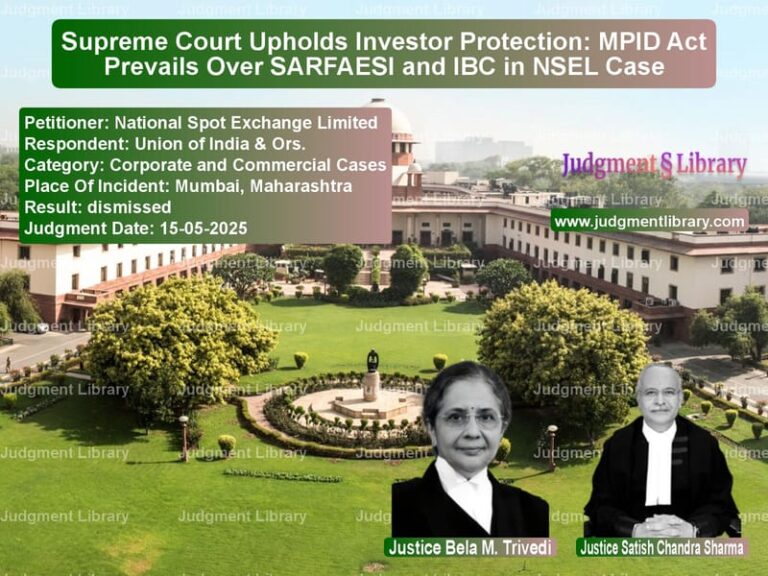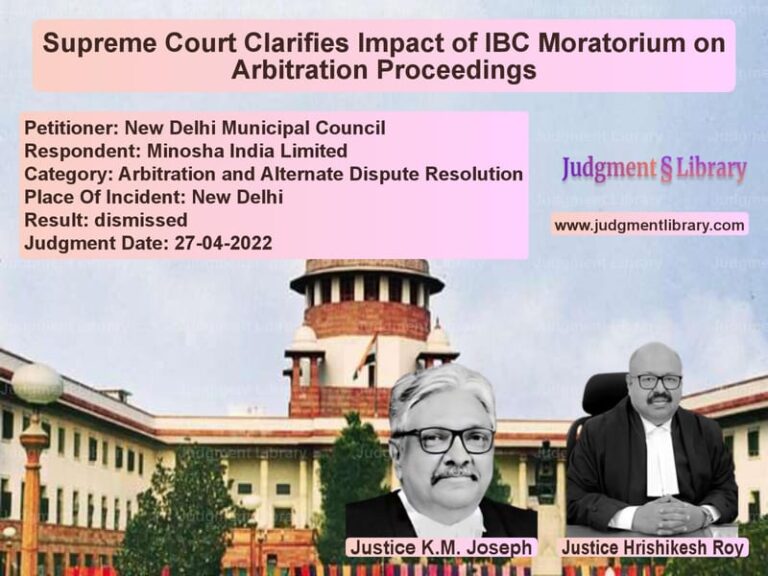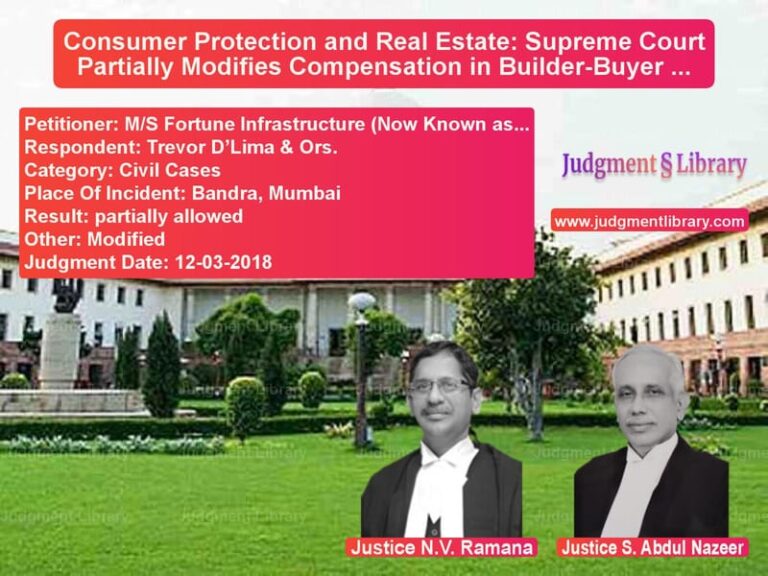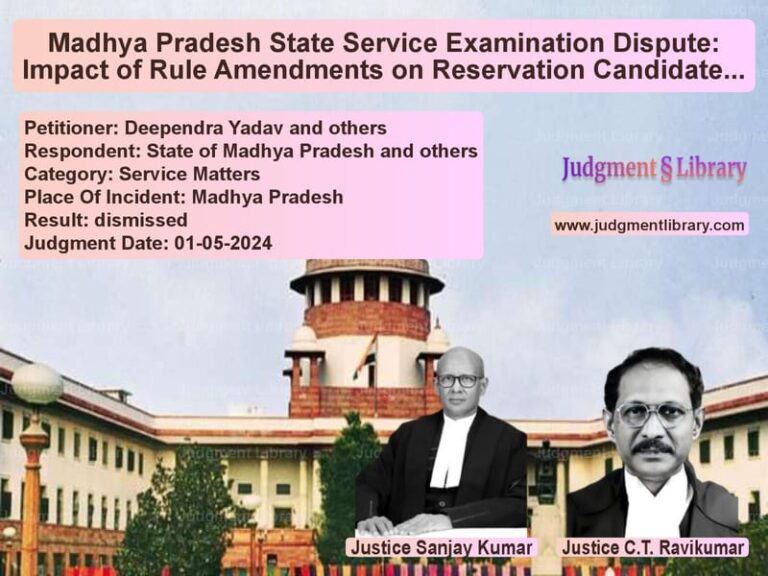Supreme Court Increases Punishment for Custodial Torture in Maharashtra
The Supreme Court of India, in the landmark case of Yashwant & Others vs. The State of Maharashtra, addressed the issue of custodial violence, reinforcing that such acts are a blatant violation of human rights. The judgment stemmed from a tragic custodial death that occurred in Maharashtra, leading to the conviction of police officers under Section 330 IPC for torture. The Court took a strict stance and enhanced the punishment of the convicted officers, increasing their imprisonment term from three years to seven years.
Background of the Case
The case revolved around the brutal police assault on Joinus Adam Yelamati, who was wrongfully detained and tortured in custody in June 1993. The police had suspected him of involvement in a robbery, leading to his arrest in the middle of the night. His wife, Zarina (PW-1), testified that the officers forcibly entered their home, tied him to an electric pole, and beat him severely before dragging him to the police station. The following morning, Joinus succumbed to his injuries.
The incident led to widespread condemnation, and the case went to trial under charges of:
- Section 330 IPC: Voluntarily causing hurt to extort a confession.
- Section 342 IPC: Wrongful confinement.
- Section 354 IPC: Assault or use of criminal force on a woman (related to the molestation of PW-1).
The Trial Court convicted the officers and sentenced them to three years’ rigorous imprisonment. However, the victims’ family and the prosecution sought a stricter punishment, arguing that a mere three-year sentence was too lenient for custodial torture leading to death.
High Court’s Findings
The Bombay High Court upheld the conviction but modified certain charges:
- Acquitted the officers under Sections 354 and 342 IPC due to inconsistencies in witness statements.
- Upheld the conviction under Section 330 IPC for custodial torture.
- Confirmed the acquittal of one accused (Raghunath Bhakte) due to lack of evidence.
Although the High Court acknowledged the severity of the crime, it did not enhance the sentence. This led the prosecution to escalate the case to the Supreme Court.
Arguments Before the Supreme Court
Prosecution’s Arguments
The prosecution contended that:
- The Trial Court’s sentence of three years was grossly inadequate given the gravity of the offense.
- The police officers had used excessive force, which directly led to the victim’s death.
- Custodial violence must be met with stricter legal consequences to prevent future instances of police brutality.
Defense Arguments
The defense argued:
- The officers had no intention to cause death and were merely conducting an investigation.
- The injuries sustained by the victim were not fatal in isolation, and other medical factors contributed to his death.
- The accused had already served part of their sentence and should not be subjected to additional imprisonment.
Supreme Court’s Observations
The Supreme Court took a firm stance on custodial torture, making the following observations:
- “Custodial violence is the worst form of abuse of state power and must be met with strict consequences.”
- “The concept of democratic policing must replace coercion and brutality in law enforcement practices.”
- “The Constitution guarantees dignity to every individual, and no officer has the right to violate that under the guise of investigation.”
- “The punishment awarded by the lower courts was insufficient considering the brutality inflicted upon the victim.”
Final Judgment
The Supreme Court delivered a stringent ruling, stating:
- The conviction under Section 330 IPC was upheld.
- The sentence was enhanced from three years to seven years of rigorous imprisonment.
- All convicted officers were directed to surrender immediately to serve their remaining sentences.
- Failing to comply, the authorities were ordered to take them into custody within eight weeks.
Impact of the Judgment
The ruling sets a crucial precedent against custodial torture and police excesses. The key takeaways from the judgment include:
- Strict enforcement of anti-custodial violence laws: The ruling sends a strong message that custodial torture will be met with harsh punishment.
- Recognition of police accountability: Officers who engage in such acts cannot escape the law under the pretext of duty.
- Judicial emphasis on human rights: The Court reinforced the fundamental right to dignity and the importance of humane policing.
By enhancing the punishment for police brutality, the Supreme Court reaffirmed its stance that custodial violence is a serious crime that will not be tolerated under any circumstances.
Petitioner Name: Yashwant & Others.Respondent Name: State of Maharashtra.Judgment By: Justice N.V. Ramana, Justice Mohan M. Shantanagoudar.Place Of Incident: Maharashtra.Judgment Date: 04-09-2018.
Don’t miss out on the full details! Download the complete judgment in PDF format below and gain valuable insights instantly!
Download Judgment: Yashwant & Others vs State of Maharashtra Supreme Court of India Judgment Dated 04-09-2018.pdf
Direct Downlaod Judgment: Direct downlaod this Judgment
See all petitions in Custodial Deaths and Police Misconduct
See all petitions in Attempt to Murder Cases
See all petitions in SC/ST Act Case
See all petitions in Judgment by N.V. Ramana
See all petitions in Judgment by Mohan M. Shantanagoudar
See all petitions in partially allowed
See all petitions in Modified
See all petitions in supreme court of India judgments September 2018
See all petitions in 2018 judgments
See all posts in Criminal Cases Category
See all allowed petitions in Criminal Cases Category
See all Dismissed petitions in Criminal Cases Category
See all partially allowed petitions in Criminal Cases Category







